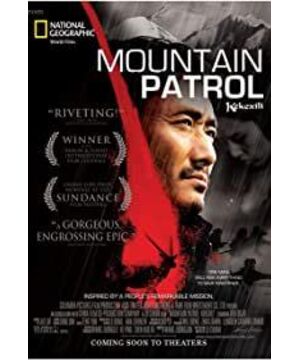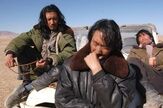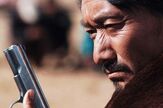The frigid wind is blowing in Hoh Xil. In the harsh conditions known as the "Forbidden Zone of Life", who would have thought of how to protect this desolate land; how much human greed can be hidden with the sound of a gunshot? How many shocking secrets did the crime leave behind? How much blood and blood was there in the last habitat of the Tibetan antelope? Through the eyes of the Tibetan antelope, it seems that you can hear the sighs of Ritai, the captain of the mountain patrol.
As the leader of the mountain patrol team, Ritai's words and deeds determined the fate of the mountain patrol team. The holy plateau and snow-capped mountains nurtured him. His protection of this Hoh Xil became pure and natural. In the wind and snow, he bravely ran forward with a gun, even his hair blown by the wind could not hide the stubbornness in his eyes. He is determined, persistent, and decisive in his actions. He let go of a group of poachers when there was not enough food. He is a person with a big-picture awareness. The harmonious life between man and nature in Hoh Xil is his greatest wish, and the conflict between ideal and reality makes him become vigorous and resolute. Holding a long gun is the calmest side he left to the audience, and it is a true portrayal of his responsibility for the mountain patrol career.
Ritai not only has a typical masculine temperament, but also has a tender and delicate side image. When the mountain patrol team found a poaching gang and found the Tibetan antelope skins they cut, there was a sadness in his eyes that was suppressed under calmness. Hundreds of Tibetan antelope skins told the bloody massacre, God's The vision reflects the helplessness and sadness of reality. "Have you ever seen someone who kowtows? Their faces and hands are very dirty, but their hearts are very clean." These poetic words also symbolize the hard work and happiness of the mountain patrol mission. What if you are covered in bruises and bruises? His heart is pure, his faith is pure, how much can the wind and snow bear him? Ritai's inadvertent emotional expression reflects his delicate and tender side.
The extremely harsh natural environment, the cruel poachers and the inner beliefs of Japan and Thailand constitute a sharp contrast, which is the externalization of the contradiction between the ideal and the reality in the heart of Japan and Thailand. Faced with the shortage of food, Ritai decided to let go of several poachers. When asked, "Will they make it out of the mountain alive?", his silence reflects the inner contradiction. In order to save the lives of the team members, even knowing that it was a crime to sell Tibetan antelope skins also reflected his inner struggle about human nature. Being outnumbered, he is in a very dangerous situation and can firmly want the poaching leader to follow him. The film reflects his pursuit of ideals all the time. In order to maintain their faith, they must face death head on.
No matter how small life is, not giving up faith in life is the deepest inspiration that Ritai gave to the audience. Ritai is like this, sacrificing for faith in a pure spiritual world, and being a hero who does not regret in a difficult life. Death is the end of a person's body, but also the self-liberation of Ritai's heart. A great hero who did not deviate from his beliefs is the most proud thing.
View more about Mountain Patrol reviews










